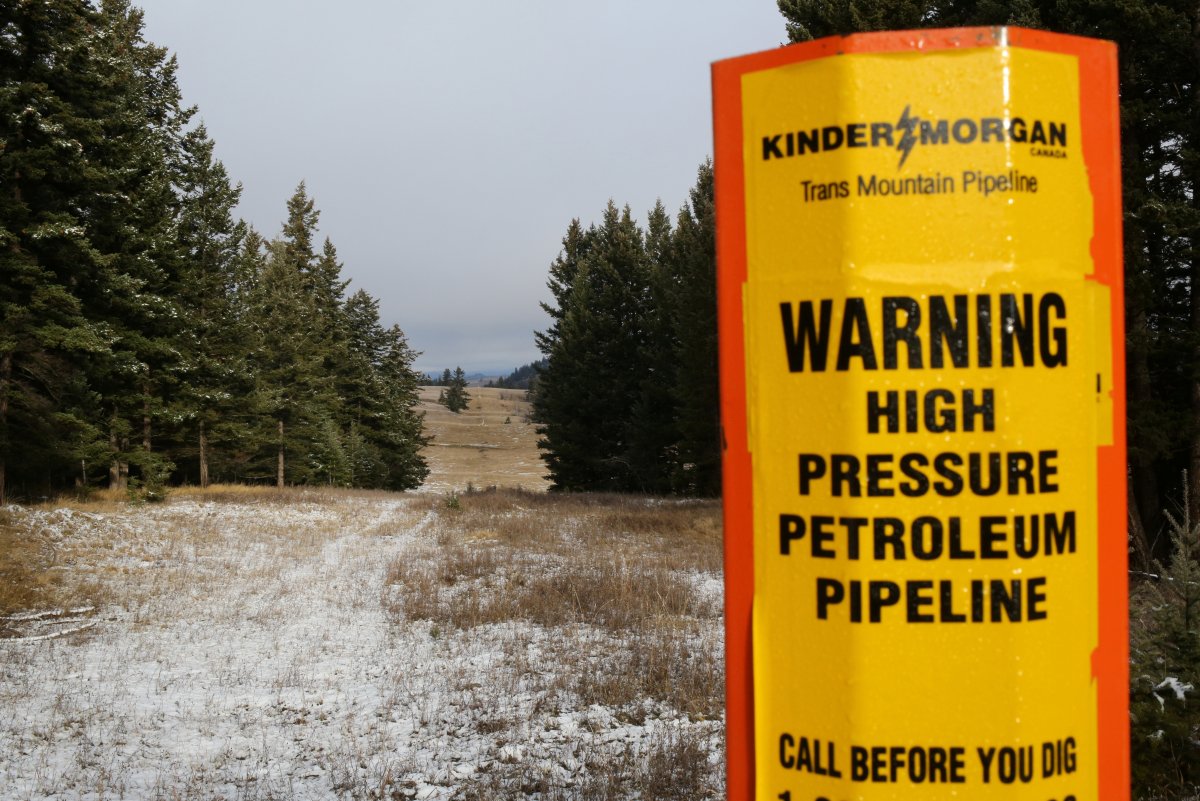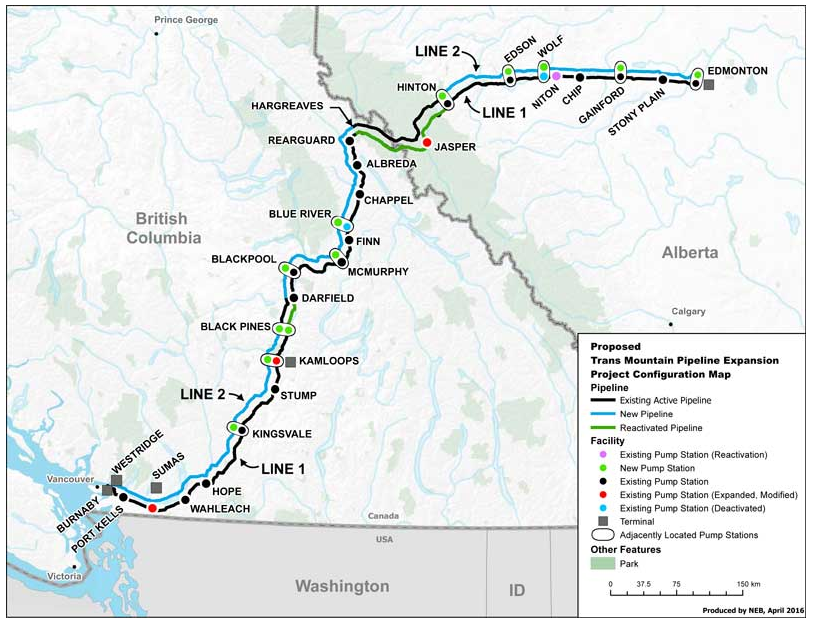Few issues in Canada are as divisive as pipelines. And few pipelines have challenged the political unity of the country as much as Kinder Morgan’s Trans Mountain pipeline.

On April 8, the energy infrastructure giant announced it would push the pause button on its $7.4-billion project to expand the pipeline, which carries Alberta crude from Edmonton to Burnaby, on the coast of British Columbia. The company said it would abandon plans to nearly triple the capacity of Trans Mountain — from 300,000 barrels per day (bpd) to nearly 890,000 bpd — unless Canada could resolve the legal challenges facing the project by May 31. In particular, Kinder Morgan referred to “continued actions in opposition to the project” by B.C.’s provincial government.”
Since then, the political squabbling over Trans Mountain has only grown more intense. Alberta has threatened to throttle the flow of oil to B.C., and Saskatchewan is thinking along the same lines.
B.C. is waiting on its provincial Court of Appeal to advise by April 30 on whether it can restrict increased amounts of oil from entering the province, even though pipelines are under federal jurisdiction. Meanwhile, Prime Minister Justin Trudeau, who approved the expansion in November 2016, has so far failed to sway B.C. Premier John Horgan. His government is thinking of boosting its own powers to control the flow of oil, in order to thwart B.C.’s court challenge.
And both Ottawa and Alberta have floated the idea of providing financial support, among other things, in order to rescue the project. No matter what happens, it’s unlikely the matter will be resolved by May 31.
READ MORE: Kinder Morgan pipeline dispute: What to know if you haven’t been paying attention
Here is some of what experts have been saying on both sides of the debate:
Arguments in favour of Trans Mountain:
It’s essential for the Canadian economy
The U.S. is producing more and more of its own oil and gas, and Canada has been struggling for some time to get its natural resources out to sea and to global markets. Two attempts to do so through the U.S. – TransCanada Corp.’s Keystone XL and Enbridge Inc.’s Line 3 expansion – are facing roadblocks. Now the debacle around Trans Mountain suggests Canada might not even be able to add pipeline capacity on its own territory.
READ MORE: How Ottawa might try to save the Trans Mountain pipeline
“Longer-term, it would likely mean that the heavy discount on Canadian oil will remain firmly in place, crimping revenues, tax receipts, investment, production and employment in the sector.”
WATCH: What’s Ottawa’s next move on the Trans Mountain pipeline project?

It’s good for society

Get weekly money news
Less resource development could lead to more income inequality in Canada, UBC economics professor Kevin Milligan has recently argued in the Globe and Mail.
“The impact of natural resources is not just on those who work directly for natural resource companies. There are large wage-spillovers to others working in resource communities in construction, transportation and services. Moreover, resource-derived tax dollars fill up government coffers to support strong compensation in middle-class public sector jobs in nursing, education and transit. And what’s more, these benefits don’t only help provinces with plentiful resources, since our equalization formula uses the federal purse to top up provinces without comparable resource-revenue streams,” wrote Milligan, who has occasionally provided advice to the Trudeau government on tax policy and economic matters.
https://twitter.com/kevinmilligan/status/986269141328740357
The resource sector has provided Canada with a cushion of good jobs and tax dollars available for social programs when in the U.S. and elsewhere around the world automation and other technological advances have lead to stagnating middle-class incomes, according to Milligan.
We can build pipelines and lower our emissions
The world is going to remain thirsty for oil for a while, according to the Paris-based International Energy Agency (IEA). Even with the number of electric vehicles on the road rising from less than 2 million today to 300 million by 2040, global oil demand would barely budge, according to the agency’s “New Policies Scenario,” which incorporates existing legislation and announced policy commitments on emissions and climate change.
“Many commentators say we are writing the obituary for oil demand … it is certainly true in the passenger car segment and in power generation, but it is not true in the other two elements of oil demand: transportation and petrochemicals,” an IEA researcher recently told Reuters.
READ MORE: Sask. aims to introduce export permits for oil and gas due to B.C.’s Trans Mountain delays
Many analysts and economists question the notion that not building pipelines will keep Alberta’s oil in the ground. Instead, the province’s resources will find their way to market via more expensive transportation, like rail.
“To be sure, blocking pipelines will lower carbon emissions, since oil and gas production in Alberta will decline (slightly). But the costs of that could easily exceed $1,500 per tonne, based on my own estimates from National Energy Board analysis,” wrote Trevor Tombe, an associate professor of economics at the University of Calgary and a member of Alberta Market Access Task force.
READ MORE: Mixed results in poll over Trans Mountain pipeline debate
An alternative approach is to let the market decide which high-emission projects are worth building and which aren’t by imposing a price on carbon (think: carbon taxes or cap and trade).
“Here’s the key: it’s policy not projects that bear responsibility for our emissions target,” Tombe argued in Maclean’s.
“Blocking pipelines achieve less emissions reductions, at substantially greater cost, than the most efficient approach of pricing carbon.”
The Trudeau government seems to be thinking along similar lines. The prime minister has said that the Trans Mountain expansion “was always a trade off” for climate action in Alberta.
WATCH: Kinder Morgan threatens to cancel pipeline expansion

ARGUMENTS AGAINST TRANS MOUNTAIN:
It’s a setback in the fight against climate change
Opponents of Trans Mountain say Canada can’t meet its 2030 Paris Agreement emissions target if it keeps adding infrastructure for high-emitting industries, such as the Trans Mountain pipeline.
Under the 2015 UN-sponsored accord, Canada has committed to lowering its total greenhouse gas emissions to 517 megatonnes of carbon dioxide equivalent per year, down from 722 megatonnes in 2015.
In December, the government delivered a report to the United Nations outlining progress on reaching that target. The report acknowledged that both current and planned policies are likely to leave the country 66 megatonnes short of its target. That figure is 50 per cent higher than a similar report made to the UN 18 months ago.
READ MORE: Could ‘Free the Beer’ decision be applied to Trans Mountain? This lawyer doesn’t think so
It threatens local ecosystems
The other big concern Trans Mountain opponents have is about its impact on the local ecosystem. Expansion of the pipeline implies a seven-fold increase in tanker traffic through B.C.’s Burrard Inlet, increasing the risk of spills near densely populated areas, according to the David Suzuki Foundation.
In addition, “approval could push the already fragile population of 76 resident orcas on B.C.’s south coast to extinction.”
Environmentalists also say the official review of the Trans Mountain expansion didn’t go deep enough in analyzing the potential risks of accidents, including a spill of the diluted bitumen (dilbit) the flows through Trans Mountain.
WATCH: B.C.-Alberta pipeline battle heats up

It ignores Indigenous rights
READ MORE: B.C. Premier says no ‘majority rule’ needed for Indigenous support of Trans Mountain expansion
According to Trans Mountain, of the more than 133 Aboriginal communities and groups with an interest in the pipeline or interests potentially affected by it, 43 have signed benefit agreements. Thirty-three of those groups are in B.C.
READ MORE: ‘We’ve made our decision’: B.C. First Nation speaks up for Trans Mountain pipeline
The Treaty Alliance Against Tar Sands Expansion has a list of 53 First Nations in B.C. that are against the project, including the Squamish and Tsleil-Waututh who have vocally led opposition on the South Coast.
WATCH: Trudeau doesn’t have consent of all First Nations, pipeline protester says

It’s not as good for business as you think
This may not be an argument about the Trans Mountain specifically, but a number of voices in the financial world are warning about the risk of continued investment in Canada’s oil sands.
London-based HSBC, for example, announced on April 20 that it will no longer finance oil sand projects that involve building new facilities from the ground up (so-called greenfield projects). The bank, which also targeted offshore oil and gas projects in the Arctic and coal-fired power, said it recognized “the need to reduce emissions rapidly to achieve the target set in the 2015 Paris Agreement to limit global temperatures rises to well below 2°C.”
READ MORE: Kinder Morgan CEO says Trans Mountain pipeline may be ‘untenable’
France’s BNP Paribas and Dutch bank ING Group have also adopted a similar position.
– With files from Reuters and the Canadian Press and Global News 980 CKNW’s Simon Little









Comments